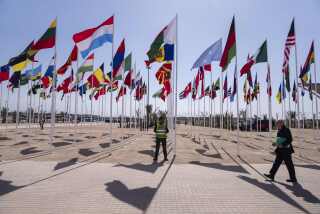IMF Stops Short of Endorsing U.S. Debt Plan
- Share via
WASHINGTON — The International Monetary Fund on Tuesday called interest-rate cuts, low inflation and open markets vital for the economic health of the industrial and developing world.
“A reduction in world interest rates and a more open trading system . . . remain of vital importance,” the fund’s policy-making Interim Committee said in a communique.
The IMF, which polices the world economy, also welcomed a new U.S. plan to help out debt-ridden developing countries, but stopped short of endorsing it fully. Worried about the future of democracy in the debt-ridden nations of Latin America, Washington has put forward a radical plan to slash the debt and interest rate burden of the Third World.
While supporting the importance of debt reduction, the committee decided to study certain key aspects of the U.S. proposal further after some of its members expressed fears the plan could lead to a government bailout of commercial banks.
The committee said major nations could also help ease the debt crisis by resisting protectionism and working hard to put their economies into better balance.
“Early action to reduce the U.S. federal budget deficit is essential as well as steps to improve the . . . (trade) position of the United States without pushing up interest rates,” it said.
Third World debtors reckon they will have to ante up an extra $10 billion in interest payments per year as a result of the rise in interest rates since last summer. Interest rates have risen as the United States and other major nations have fought to contain inflationary pressures sparked by stronger-than-expected economic growth.
“The committee agreed that it was essential to deal promptly and effectively with emerging price pressures in order to ensure the sustainability of the current expansion,” the communique said.
But IMF Managing Director Michel Camdessus acknowledged that there were some differences in the committee about how best to help ease the Third World’s crippling debt.
However, he downplayed their importance, saying that everyone agreed on the broad thrust of the strategy to cut the debt burden but just differed over the specifics.
The major sticking point is a U.S. proposal to help Third World debtors meet their interest bills by using funds from the IMF and the World Bank to effectively guarantee payment.
Most European countries have voiced concern that creditor governments would end up picking up the tab for interest payments due to commercial banks, something the IMF has resolutely opposed in the past.
The Interim Committee tried to get around the differences on Monday by agreeing to study the issue.
The committee said the IMF itself should decide by the end of the year whether it needs more money to carry out its enhanced role in the new strategy to tackle Third World debt.
More to Read
Sign up for Essential California
The most important California stories and recommendations in your inbox every morning.
You may occasionally receive promotional content from the Los Angeles Times.













